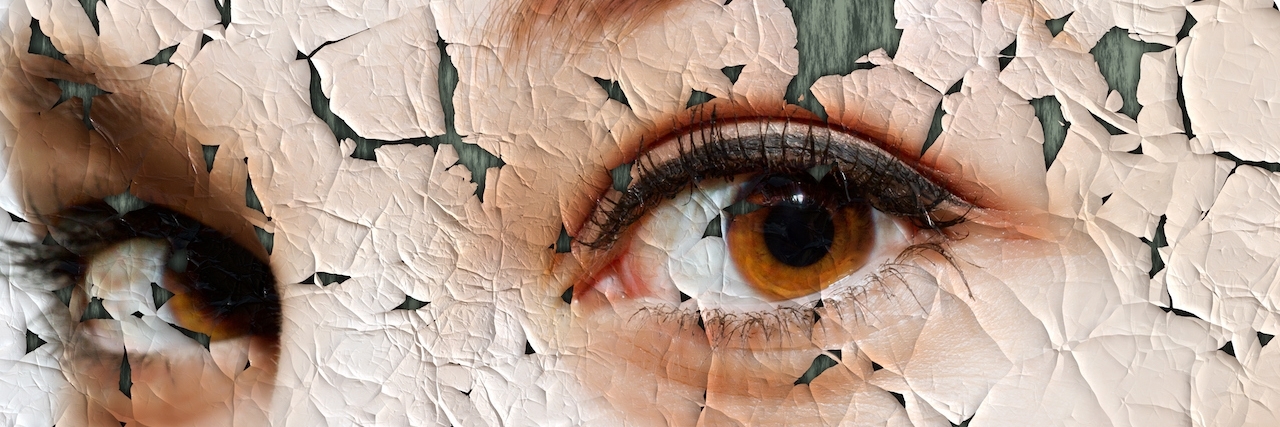Eczema is more than just dry, itchy skin. While common in childhood and infancy, most children grow out of it. Those of us unlucky enough to have eczema as adults face a lifetime of scarring, both physically and emotionally. Most of us were not told as children it would be a lifelong chronic illness (because again, most kids grow out of it). I didn’t find out until I was 28 that I would have it all of my life. Up until that point I still thought it would get better and disappear eventually. I cried when I found that out.
Technically, eczema is a generic term for any type of itchy rash. Those of us with eczema know that description doesn’t do it justice. Our skin also burns, and stings and hurts… a lot.
Eczema is waking up with bloody sheets because you scratched up your legs in your sleep.
Eczema is knowing you are rubbing off a layer of skin while scratching but being unable to stop.
Eczema is not being able to wear black clothing because it gets ashy from skin flakes.
Eczema is not being able to use most soaps, or lotions, or shampoos or even makeup because of how it reacts with your skin.
Eczema is having scars from bad outbreaks.
Eczema is having your clothes stick to your legs or arms because of the weeping, open sores.
Eczema is moisturizing five or six times per day and still being dry and flaky.
Eczema is never being able to take a hot shower or bath because it dries you out even more.
Eczema is knowing you need to shave your legs because it itches, and itching makes it worse, but also knowing shaving will make it worse.
Eczema is needing topical steroids several times a day and praying it doesn’t get bad enough to need oral steroids.
Eczema is having widespread pain across the surface of your skin so bad that you fantasize about dipping your hands in a vat of acid because maybe that will hurt less.
Eczema is not fun, it is not pretty, and it is not easy to deal with. I know what some of my triggers are — certain soaps (even natural ones), fabric softener, grasses and latex. I know I have food triggers, but I can’t always narrow them down. Most of the time I don’t know what is causing a breakout, I just know the longer I go without being able to contain it, the worse it will get. I have a daily routine that includes prescription steroidal and non-steroidal creams, lotions, emollients, gloves when I sleep and do any type of housework.
I’ve been stared at while at the beach and while shopping. I’ve been asked if I was contagious. I was asked to leave a pool party. I had friends in junior high who didn’t want to sit by me. Once I had a breakout so bad that when I went into the doctor’s office the nurse put me into a quarantine room. When the doctor walked into the room he actually gaped and dropped his clipboard on the floor.
And yet, I’m frequently told by people (even dermatologists) that it’s just dry, itchy skin. People frequently tell me things like coconut oil, essential oils, green tea and even exercise will “cure” my eczema. I actually tried one of the essential oil blends a coworker gave me (because I figure “what can it hurt?”). I had a horrible breakout, and when I reported it to her she didn’t believe me. “No one should be allergic to essential oils,” she said. Well I am apparently.
I’ve had 33 years to learn to deal with my eczema, and it’s hard. Hard, because most people don’t consider it a chronic disease. I recently just started identifying as a person with a chronic disease.
But admitting that to myself actually made me free. Yes, I have red, scaly patches on my legs, but it’s part of my chronic illness so why should I be ashamed to wear shorts at the beach? Yes, I have a rash on my face and hands, but it’s part of my chronic illness so why should I tax myself trying to hide it? No, I can’t use the product you are offering because it will make my chronic illness worse, so I shouldn’t worry about offending you.
Yes, I have a chronic illness. Eczema. No there is no cure. Yes, I can live with knowing that.
The Mighty is asking the following: What is a part of your or a loved one’s disease, disability or mental illness that no one is aware of? Why is it time to start talking about it? Check out our Submit a Story page for more about our submission guidelines.

